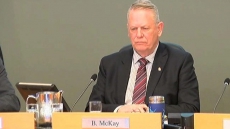OTTAWA — A major new report is calling for dramatic changes to help shore up Canada's news industry as it faces a massive decline in revenues and a growing "fake news" problem.
The 100-page Public Policy Forum report calls for a sales tax on foreign companies selling digital subscriptions in Canada and a "Future of Journalism and Democracy" fund to help finance reliable news and information, with $100 million in federal seed money.
The dozen recommendations also include:
— Tax changes that would provide the fund with $300 to $400 million a year;
— A new "local" mandate for news agency The Canadian Press;
— Requiring the CBC to share for free the right to publish its news content with other organizations, with an initial focus on not-for-profit groups;
— Denying the public broadcaster the ability to sell advertising on its digital platforms.
Veteran journalist Edward Greenspon, who authored the report, said Canada's news industry finds itself in deep crisis, brought on largely by a shift in advertising to digital media sites.
The recommendations are meant to ensure Canada's democracy is well served by a strong, independent and trustworthy news media, Greenspon told a news conference where the report was released.
"Make no mistake: the situation for journalism, and therefore democracy, is getting worse," he said. "Canada's news industry is in the midst of an existential crisis. So, therefore, is our democracy."
Heritage Minister Melanie Joly ordered the study as part of an overall review of Canada's media landscape, in particular how it has shifted to the Internet. A Commons committee has also carried out its own study and is expected to report to Parliament by spring.
The report comes on the heels of what was just the latest in a series of layoffs by Postmedia, the country's largest chain of daily-circulation newspapers.
The company issued layoff notices earlier this week to employees at the Ottawa Citizen, Montreal Gazette and Windsor Star after the company failed to reach a 20 per cent salary reduction target it set for itself last fall.
Other news giants, including the Toronto Star and the Globe and Mail, have also cut staffing levels as they struggle with declining print advertising revenue.
Nor are television and radio newsrooms immune: Canada's national broadcast regulator warned last year that nearly half of the country's local TV stations could be off the air by 2020 without a revenue boost to pay for local news programming.
The report, entitled "The Shattered Mirror: News, Democracy and Trust in the Digital Age," relied on a half-dozen roundtables, polling and focus group research to reach its findings about how Canadians perceive the relationship between the news industry and the country's democratic institutions.
The Canadian Press participated in the roundtables and research.
Pollster Allan Gregg, whose firm Earnscliffe Strategy Group played a role in compiling the findings, said Canadians don't grasp the reality of a crisis in the news business, since they have faster access to more content than ever before.
A majority of those polled are dead-set against using taxpayer money to support the industry, Gregg added.
The report also calls for changes to the Copyright Act that would provide media companies with greater control over the news they produce. As well, non-profit organizations should be allowed to qualify for charity status under federal law to make it easier for philanthropic foundations to help fund original content.
In April, Joly launched a public consultation on media and Canadian content in a digital world that included town hall gatherings across the country.
Those forums heard a range of suggestions, including calls for new fees or taxes on foreign-owned digital media players as a means of helping to prop up the domestic news industry.
Others, however, have pre-emptively scolded the government for even considering any kind of taxpayer-funded support for media outlets, arguing that audiences will ultimately turn toward new digital platforms to stay informed.
Internet freedom advocacy group OpenMedia has petitioned against what it calls an Internet tax, but has asked federal Finance Minister Bill Morneau to consider applying sales taxes evenly across foreign online vendors operating in Canada.
In a report on Canada's entertainment and media sector issued last summer, PricewaterhouseCoopers predicted steady growth in Internet advertising revenues, and an acceleration of the recent downturn in newspaper publishing.
Media firms have complained that, while their focus turns increasingly to online publishing, digital advertising revenues have not come anywhere close to replacing those previously generated from print ads.
Joly's office has called the shifts in news revenue streams "significant," and said the government hopes its Canadian content consultations can help it assess how to best support the production of local, credible and reliable news and information.





